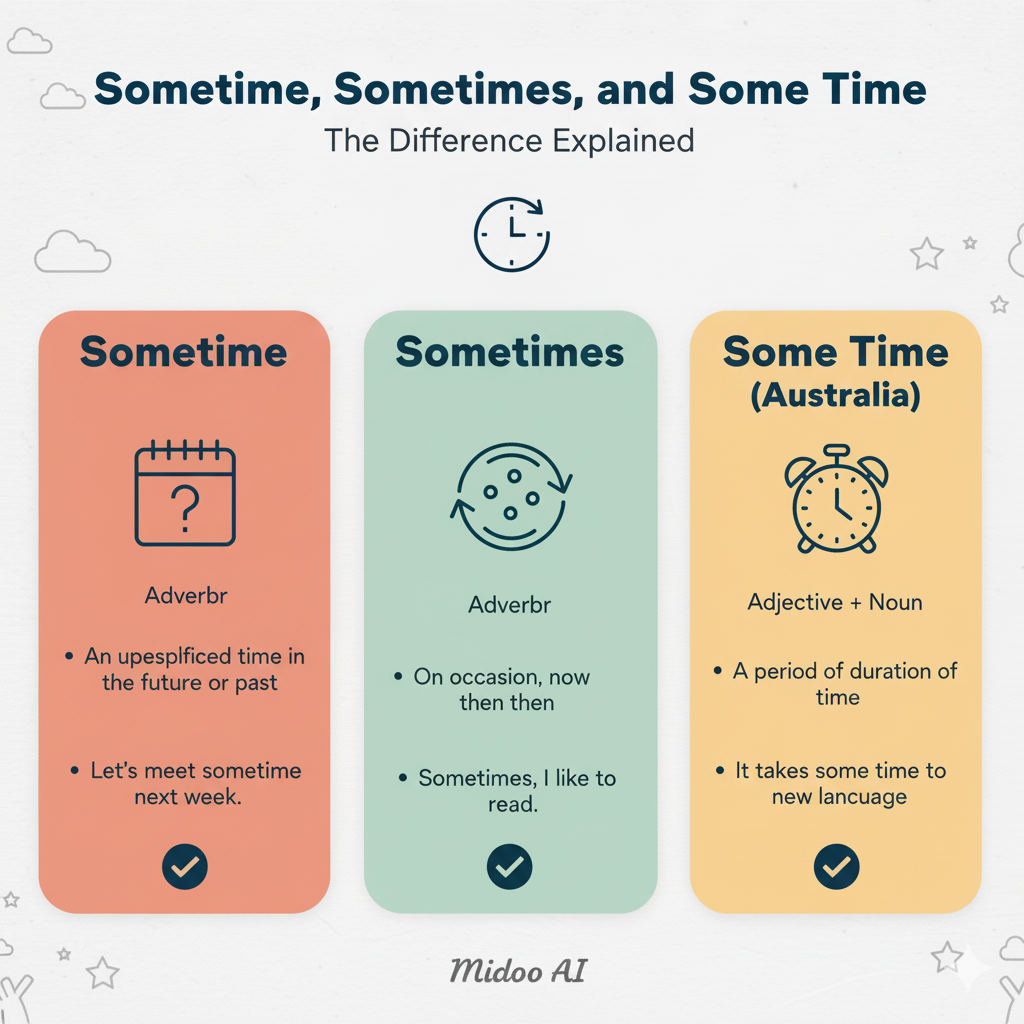Sometime vs. Sometimes vs. Some Time—What’s the Difference?

English has plenty of words that look almost the same but mean completely different things. Sometime, sometimes, and some time are three of the most confusing examples. They’re spelled nearly identically, but their meanings and uses are distinct.
If you’re learning English with tools like Midoo AI, you’ve probably noticed how often these words appear in everyday conversations, emails, and even news articles. Understanding their differences will help you avoid embarrassing mistakes and express yourself more clearly. Let’s break it down step by step.
1. Sometime (one word, no “s”)
Meaning: At an unspecified or indefinite point in time.
Think of sometime as a vague reference to when, without being exact.
Examples:
- Let’s meet for coffee sometime next week.
- The concert was recorded sometime in 2020.
- I’ll call you sometime tomorrow.
👉 In each case, sometime suggests a time exists, but it’s not fixed or defined.
Quick tip: If you can replace it with “at an unspecified time” and the sentence still works, then sometime is the correct choice.
2. Sometimes (with “s” at the end)
Meaning: Occasionally, from time to time, not always.
This word is an adverb of frequency, similar to often or rarely, but in the middle of that scale.
Examples:
- I sometimes forget to bring my keys.
- He sometimes goes jogging in the evening.
- Sometimes it’s hard to stay focused when you’re tired.
👉 Unlike sometime, which refers to a specific but unknown time, sometimes refers to how often something happens.
Quick tip: If you can replace it with “occasionally”, you’re safe to use sometimes.
3. Some Time (two words)
Meaning: A period of time, often a long one.
When you write some time as two words, it refers to a measurable chunk of time, not frequency or an unspecified moment.
Examples:
- It’s been some time since we last met.
- She needs some time to finish her project.
- We’ll need some time to discuss the details.
👉 Here, some functions as an adjective describing time.
Quick tip: If you can replace it with “a period of time”, you should use some time.
4. How to Remember the Difference
Here’s a quick way to avoid confusion:
- Sometime = at an unspecified point in time
- Sometimes = occasionally, not always
- Some time = a period of time
Memory trick:
- Sometime (no “s”) = when
- Sometimes (with “s”) = how often
- Some time (two words) = how long
5. Common Mistakes Learners Make
- ❌ I need sometime to relax.
✅ I need some time to relax. - ❌ I’ll call you sometimes this evening.
✅ I’ll call you sometime this evening. - ❌ It’s been sometime since we talked.
✅ It’s been some time since we talked.
👉 Notice how changing one letter or space completely changes the meaning.
6. Examples in Everyday English
To see the differences clearly, compare these sentences:
- We should meet sometime this month. (unspecified date)
- I sometimes work from home. (frequency)
- It took me some time to understand the lesson. (duration)
Each sentence uses a different form correctly, but you couldn’t swap them without changing the meaning.
7. FAQs
Q1: Can I say “sometime ago”?
No. The correct phrase is “some time ago” because you’re referring to a period of time, not an unspecified point.
Q2: Is “sometimes” formal or informal?
It’s neutral. You can use sometimes in both casual speech and formal writing.
Q3: Can “sometime” mean “former” (like “sometime teacher”)?
Yes, but this usage is old-fashioned or literary. For example: The sometime king of Spain now lives abroad.
Q4: How do native speakers keep them apart?
Mostly by intuition and exposure. That’s why practicing with apps like Midoo AI helps—you’ll see them in realistic sentences and conversations until the differences feel natural.